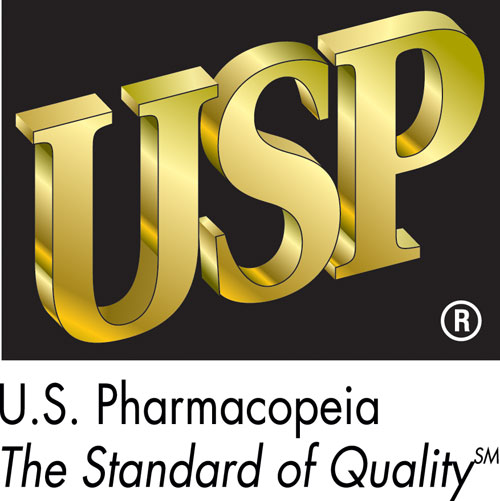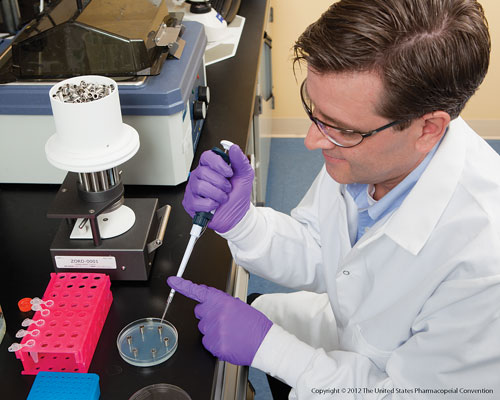October 1, 2012 (Vol. 32, No. 17)
Developing Quality Standards for Biologic Drugs
The United States Pharmacopeial Convention (USP) is dedicated to improving the health of people around the world through public standards and related products and services that help ensure the quality, safety, and benefit of medicines. As biologic drugs continue to play an expanding role in the therapeutic arena, USP has worked with scientific leaders in the biopharmaceutical community to develop quality standards that support activities in the discovery, development, manufacturing, and distribution of biologics.

About the Organization
For nearly 200 years, USP has been developing quality standards for medicines and their ingredients. A nonprofit scientific organization, USP creates both monographs (documentary standards) and reference standards (chemical and biological reference materials) used to test for the identity, strength, quality, and purity of drugs and their ingredients. A manufacturer of a drug product in the U.S. market must conform to any applicable standards published by USP to avoid possible charges of adulteration and misbranding under the U.S. Federal Food, Drug, and Cosmetics Act (FDCA). USP has no role in enforcement of its standards, which is the responsibility of the Food and Drug Administration.
USP’s Council of Experts—volunteer experts from industry, academia, and regulatory agencies as well as practitioners—provide their scientific expertise and direction to USP’s standards-setting activities. For standards related to biologics, USP experts provide their technical expertise in a wide variety of areas, including naturally derived biologics; recombinant therapeutics; vaccines; bioassays and cell-based assays; and ancillary and process materials.
USP’s public standards for biologics are conveyed in its compendia, the United States Pharmacopeia and National Formulary (USP–NF). The FDCA designates the current official version of USP–NF as the applicable compendial standard for drugs marketed in the U.S., which include biologics approved under the Public Health Service Act. Before becoming official, all standards published in USP–NF go through a public review and comment period during which stakeholders can provide input into USP’s proposed standards. Standards under review are published six times a year in the Pharmacopeial Forum—USP’s free-access, online publication for receiving comments (www.usp.org/usp-nf/pharmacopeial-forum).
Markets Served
USP standards are relevant to large pharmaceutical and biopharmaceutical companies, emerging biotechnology firms, contract manufacturing organizations, and analytical services companies. They are utilized particularly by manufacturers whose products are marketed in or imported into the U.S. USP’s standards are used by companies, regulatory bodies, and other stakeholder groups in more than 140 countries worldwide. With its headquarters in Rockville, MD, USP also has sites and offices in Hyderabad, India; Shanghai, China; São Paulo, Brazil; and Basel, Switzerland.
USP–NF provides comprehensive information to guide quality at all stages of biological manufacturing—from raw material qualification to the development and validation of product assays to packaging. USP’s standards are critical to biopharmaceutical developers, QA/QC scientists, analytical development scientists, QbD specialists, regulatory experts on biologics, bioassay developers, and biostatisticians.
Collaborative partnerships between USP and other thought-leaders in the biologics area shape industry standards. Prospective partners are invited to submit monographs and proposals to revise and modernize standards relevant to biologics and biotechnology; supply candidate materials for USP Reference Standards development; participate in USP workshops and stakeholder forums that help inform the standards-setting process; and recommend ideas for future monographs, general chapters and Reference Standards.

Capabilities
Monographs in USP–NF include tests, procedures for those tests, and acceptance criteria for determining the quality of a specific article of commerce. In addition to monographs for drug substances, drug products, and excipients, USP–NF includes general chapters, which are necessary to demonstrate compliance with particular monographs or provide information to help guide companies in their quality strategies.
Some specific USP–NF general chapter topics for biologics cover the design, validation, and analysis of bioassays; quality attributes of protein A; cellular and tissue-based products; gene therapy products; growth factors and cytokines; ancillary materials in cell manufacturing; and immunogenicity testing. Also included are general chapters on critical issues related to bacterial endotoxins; sterility testing; microbiological and bioburden control; injectibles; supply chain integrity and more.
Currently USP is working vigorously to develop new chapters on mono- and oligossacharide analysis; residual DNA analysis; host cell protein analysis; protein determination analysis; vaccines; excipient performance characteristics and more.
In support of procedures included in USP–NF monographs and general chapters, USP offers a growing list of highly characterized Reference Standards for method development, validation, and testing. USP’s catalog of supporting Reference Standards includes insulins and other peptides; low molecular weight heparins; endotoxins; excipients; amino acids and an expanding list of articles for biomanufacturing. Currently in development are Reference Standards for fetal bovine serum, filgrastim, IL-4, and oligosaccharide mixtures.
United States Pharmacopeial Convention (USP)
12601 Twinbrook Pkwy. Rockville, MD 20852
Phone: 800.227.8772, 301.881.0666
Website: www.usp.org
Date Founded: 1820
Number of Employees: More than 700







